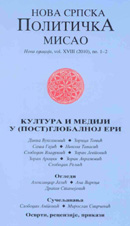| NSPM in English | |||
Engaging the Southern Democracies |
 |
 |
 |
| понедељак, 17. мај 2010. | |
|
(World Politics Review, April 30, 2010)
Last week, I highlighted the "bad news" that came out of Brasilia with regards to Washington's Iran policy. There was, however, a silver lining that should not be ignored. Brazil's President Luiz Inacio Lula de Silva hosted two meetings that week -- that of the Brazil-Russia-India-China group (BRIC) and another for the India-Brazil-South Africa forum (IBSA). What is interesting to note is that China's interest in playing a greater role in IBSA -- with some even talking about expanding that group to become CHIBSA -- was politely rebuffed. Indian Prime Minister Manmohan Singh stressed that IBSA is not simply a forum for three major rising powers, but also for states which share open political and economic systems. In other words, IBSA views itself as an embryonic "League of (Southern) Democracies," and wants to maintain that separate identity. This is even more surprising in light of the fact that China and the IBSA countries formed the "BASIC" bloc at Copenhagen, presenting a united front on climate change issues. Brazil and India both have real concerns about China's policy of maintaining an artificially low value for the yuan, concerns that they share with the developed nations of the West. And despite the fact that India and China share the goal of reshaping global institutions to give more voice to the Eastern powers, the two neighbors still remain rivals in a number of areas - including, as David Axe's WPR column noted this week, competition for water and energy resources. Several years ago, Harry Harding postulated that the global order is increasingly defined by two major "parties": the Euro-Atlantic West and an emerging, looser Russo-Chinese coalition. IBSA is a reminder that there is also a bloc of "independents" whose allegiance to one or the other is not guaranteed. That the BRIC has begun to take shape and acquire some degree of solidity reflects what might be described as the "Field of Dreams" logic of international affairs: If you build it, they will come. In other words, simply by having presidents, foreign ministers and other officials meeting on a regular basis and discussing agendas, as well as getting their respective bureaucracies accustomed to liaising with each other, the BRIC has transformed itself in a few short years from being a Goldman Sachs concept to a rudimentary international forum -- in much the same way that the Shanghai Cooperation Organization was born from a series of meetings initially designed to settle China's frontier issues with the states of the former Soviet Union. The development of both the SCO and the BRIC reverses the traditional axiom of "form follows function." The United States did not take the Shanghai process seriously until it reached a point of critical mass, when it demonstrated that it could forge a coalition of states that could negatively impact American interests in Central Asia. By then, Washington's efforts to try and obtain observer status with the SCO were rebuffed. The BRIC was similarly dismissed as a flash in the pan, but its four members have now demonstrated a certain degree of clout in world affairs. Although the grouping does not imply a common agenda, on issues where interests do converge, it provides added weight. By contrast, IBSA is only in its first stages of development, but the institutions of the Euro-Atlantic world should be proactive in reaching out to an organization that explicitly defines itself as a club of democracies. Why not propose joint NATO-IBSA naval exercises in the name of promoting maritime security in the western Indian Ocean, for instance? Why not organize a U.S.-EU-IBSA summit, to begin habituating their respective foreign policy establishments to working and meeting together? One of the most striking press reports out of Brasilia was that India's national security adviser, Shiv Shankar Menon, had conferred with Nikolai Patrushev, the head of Russia's Security Council, and Dai Binguuo, Hu Jintao's counselor. Why shouldn't there be similar confabs occurring with Western officials on a regular basis? Part of the problem, of course, is that the United States government has found it difficult to engage a multilateral format like IBSA, which, as Singh put it, consists of a major power on each continent. For Washington policymakers, U.S.-Brazil relations occur in one box, and U.S.-India ties in another. And Washington still tends to see both countries as confined to geographic regions, rather than as emerging global players. Moreover, the U.S. emphasis on immediate results means that there is little political will to engage in efforts that will not produce short-term, tangible results. If a U.S.-EU-IBSA summit, for instance, did not generate a climate change agreement or a breakthrough on trade talks, then many in Washington would question the value of holding one in the first place. The BRIC has eschewed this logic, preferring to lay its foundation brick by brick, summit by summit. Can a U.S. administration, operating on the logic of a two- and four-year electoral cycle, make a similar, long-term investment in institution-building -- an investment that may not generate immediate tangible results, but which could help to shape the course of global politics for the 21st century? The German Marshall Fund's Dan Twining rhetorically asks, "These rising powers are knocking at the door of global governance frameworks and institutions. Are Western nations willing to let them in? Are they willing to invest in relations with potentially like-minded countries such as India -- and at a level of quality and intensity that the transatlantic allies previously reserved only for each other?" The answer to this question may well determine where the southern democracies align in the future. Nikolas K. Gvosdev is the former editor of the National Interest, and a frequent foreign policy commentator in both the print and broadcast media. He is currently on the faculty of the U.S. Naval War College. The views expressed are his own and do not reflect those of the Navy or the U.S. government. Photo: Brazilian President Luiz Inácio Lula da Silva, Indian Prime Minister Manmohan Singh and South African Prime Minister Jacob Zuma (Agencia Brasil photo). |
Од истог аутора
- Russia’s Foreign Policy: What’s Next?
- Turning Russia into a Euro-Atlantic Stakeholder
- Shaping the Multipolar World
- The Realist Prism: The Ukraine That Might Have Been
- What the United States Can Learn From the Soviet War in Afghanistan
- The Realist Prism: Horse Trading with Beijing
- Resetting Russia
- Facing the Facts on Terror
- Reagan Plagiarized
- Moving NATO Forward
Остали чланци у рубрици
- Playing With Fire in Ukraine
- Kosovo as a res extra commercium and the alchemy of colonization
- The Balkans XX years after NATO aggression: the case of the Republic of Srpska – past, present and future
- Из архиве - Remarks Before the Foreign Affairs Committee of the European Parliament
- Dysfunction in the Balkans - Can the Post-Yugoslav Settlement Survive?
- Serbia’s latest would-be savior is a modernizer, a strongman - or both
- Why the Ukraine Crisis Is the West’s Fault
- The Ghosts of World War I Circle over Ukraine
- Nato's action plan in Ukraine is right out of Dr Strangelove
- Why Yanukovych Said No to Europe

.jpg)





















